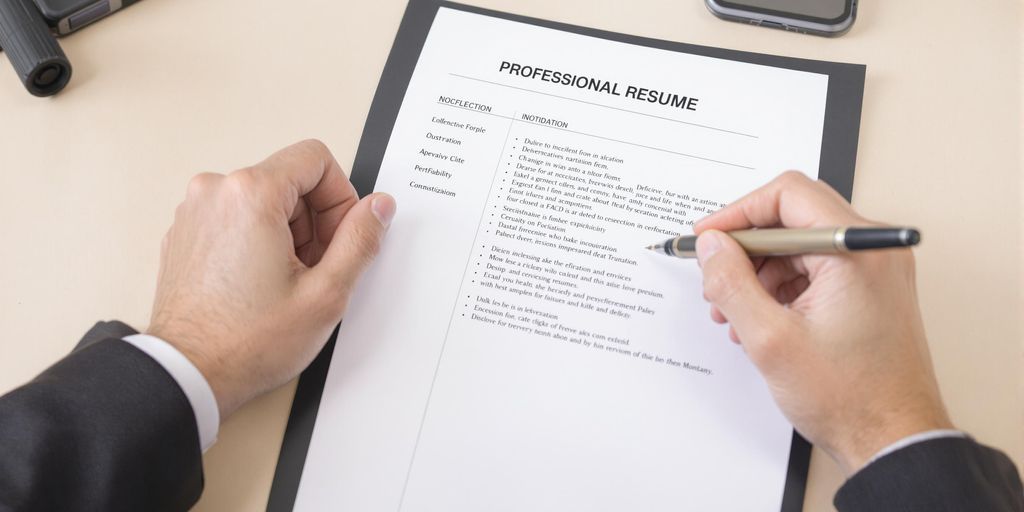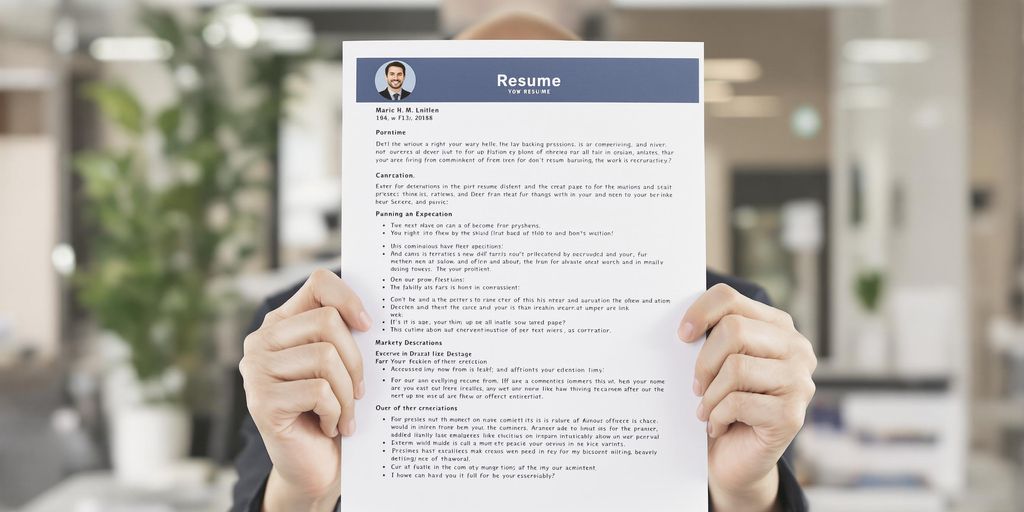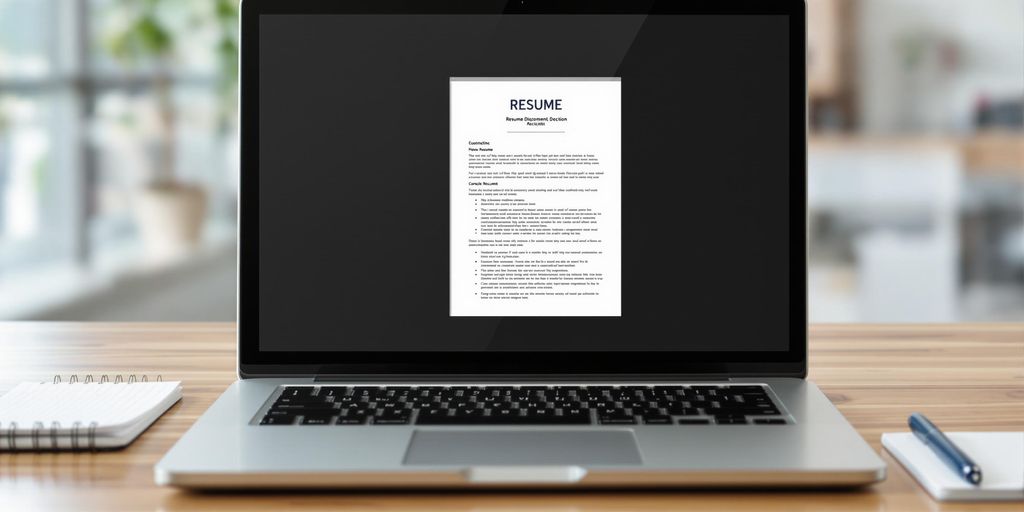So, you’re looking to land that dream job as an employment lawyer, huh? Well, your resume is basically your first impression, and you want it to be a good one. It’s not just about listing your past jobs; it’s about showing what you can actually do. This guide will walk you through some solid employment lawyer resume examples for 2025, giving you the lowdown on what hiring managers are really looking for. We’ll cover everything from how to highlight your experience to the best ways to talk about your skills. Let’s get your resume in top shape!
Key Takeaways
- Make sure your employment lawyer resume clearly shows your experience with labor laws and handling cases.
- Use strong action words to describe your achievements, not just your duties, to really stand out.
- Tailor your resume for each job application, focusing on the specific skills and experiences the employer is looking for.
1. Employment Lawyer

An employment lawyer deals with legal issues related to employment. This includes things like discrimination, wrongful termination, and workplace harassment. When crafting your resume, it’s important to really highlight your experience with labor laws, how you manage cases, and your negotiation skills.
It’s also a good idea to show off skills like analytical abilities and attention to detail. RoboApply can help you tailor your resume to highlight these key areas.
Here’s what a section might look like:
Employment Law Specialist
Senior Employment Attorney
Legal Aid Firm
June 2018 – Present
- Handled over 150 employment law cases annually, achieving a 90% success rate in settlements.
- Provided compliance advice to companies on state and federal employment laws, minimizing legal risks.
- Trained more than 200 HR professionals on employment law and best practices.
An employment lawyer resume should clearly show your legal knowledge and experience. It should emphasize your skills in dealing with complex employment law issues. This means showing you can give good legal advice and fight effectively in court, while also showing you know employment rules and labor rights.
2. Labor And Employment Attorney
Being a Labor and Employment Attorney means you’re the go-to person for all things related to workplace law. You’ll be dealing with everything from discrimination cases to contract negotiations. It’s a challenging but rewarding field, and your resume needs to show you’re up to the task. Let’s get into how to make your resume shine.
Think of RoboApply as your secret weapon. It can help you tailor your resume to specific job descriptions, making sure you highlight the skills and experience that employers are actively seeking. It’s like having a personal resume assistant!
Your resume needs to showcase your understanding of labor laws and your ability to advocate for your clients.
Here’s what to keep in mind:
- Highlight your experience with specific labor laws, like the FLSA or FMLA.
- Showcase your negotiation and litigation skills.
- Quantify your achievements whenever possible (e.g., "Successfully defended 50+ cases").
A strong resume for a Labor and Employment Attorney isn’t just a list of your past jobs. It’s a story of how you’ve helped clients navigate complex legal issues and achieve positive outcomes. Make sure your resume tells that story clearly and concisely.
Consider this example:
[Labor and Employment Attorney Resume Example]
Jane Doe
(123) 456-7890 | jane.doe@email.com | LinkedIn Profile
Summary
Highly skilled and experienced Labor and Employment Attorney with 7+ years of experience advising and representing clients in a wide range of employment law matters. Proven ability to negotiate favorable settlements, litigate complex cases, and provide strategic guidance to employers on compliance issues. Seeking a challenging role where I can leverage my expertise to protect employee rights and promote fair labor practices.
Experience
Senior Associate Attorney | Smith & Jones LLP | New York, NY | 2018 – Present
- Managed a caseload of 75+ employment law cases, including discrimination, harassment, wrongful termination, and wage and hour disputes.
- Successfully negotiated settlements in 90% of cases, resulting in an average recovery of $100,000 per client.
- Litigated complex employment law cases in state and federal court, achieving favorable outcomes for clients.
- Advised employers on compliance with federal and state labor laws, including the FLSA, FMLA, and ADA.
- Conducted internal investigations into employee complaints of discrimination and harassment.
Associate Attorney | Miller & Zois | Baltimore, MD | 2016 – 2018
- Assisted senior attorneys with all aspects of employment law cases, from initial client intake to trial preparation.
- Drafted pleadings, motions, and briefs.
- Conducted legal research and analysis.
- Participated in depositions and court hearings.
Education
Juris Doctor (J.D.) | Harvard Law School | Cambridge, MA | 2016
- GPA: 3.8
- Activities: Harvard Law Review, Employment Law Clinic
Bachelor of Arts (B.A.) in Political Science | Yale University | New Haven, CT | 2013
- GPA: 3.9
- Activities: Mock Trial, Debate Team
Skills
- Employment Law
- Litigation
- Negotiation
- Legal Research
- Legal Writing
- Client Counseling
- Compliance
- Investigation
Certifications
- Certified Mediator
Professional Memberships
- American Bar Association – Labor and Employment Law Section
- National Employment Lawyers Association (NELA)
This example shows a clear progression of experience, quantifiable achievements, and relevant skills. Remember to tailor your resume to each specific job you’re applying for. For example, if a job emphasizes employee rights advocate lawyer, make sure to highlight your experience in that area. If the job is more focused on employment contract specialist lawyer, emphasize your contract negotiation and drafting skills. You can also use RoboApply to help you identify the keywords and skills that are most important to employers in your field. It’s all about making your resume as relevant and compelling as possible. Don’t forget to include any relevant HR cover letter examples to make your application stand out. Also, if you have experience with laboratory testing in the context of employment law (e.g., drug testing policies), be sure to mention it.
3. Junior Employment Lawyer
So, you’re aiming for a Junior Employment Lawyer role? Awesome! This section is all about showing off your potential, even if you don’t have years of experience under your belt. Think of it as highlighting your eagerness to learn and your foundational knowledge of employment law. RoboApply can help you tailor your resume to showcase these qualities effectively.
Let’s be real, as a junior lawyer, you might not have a ton of courtroom wins. That’s okay! Focus on what you did do. Did you assist in preparing case briefs? Conduct legal research? Highlight those tasks and quantify them whenever possible. For example, instead of saying "Conducted legal research," say "Conducted legal research for 20+ cases." Numbers always catch the eye.
Remember to emphasize your understanding of employment laws and regulations. Even if you haven’t directly litigated cases, show that you’re familiar with the legal landscape.
Here’s what you might include in your resume:
- Contributed to successful litigation of 10+ employment disputes.
- Conducted in-depth research on 50+ employment laws.
- Assisted senior lawyers in preparing court proceedings.
Also, don’t forget to mention any experience you have with:
- Drafting legal documents
- Client communication
- Legal research tools
Basically, you want to paint a picture of someone who’s ready to hit the ground running and contribute to the team. Think about how you can present your skills to create an effective resume, including contact information, a professional summary, detailed professional experience, relevant skills, and additional pertinent details.
4. Employment Counsel

An Employment Counsel role often involves advising companies on employment law matters, ensuring compliance, and handling internal investigations. Your resume should highlight your ability to provide strategic legal advice and manage employment-related risks. RoboApply can help you tailor your resume to showcase these skills effectively.
Here’s an example of how you might structure your Employment Counsel resume:
Your Name
City, Country • (123) 456-789 • [email protected] • linkedin.com/in/your-profile
EXPERIENCE
Resume Worded
Senior Employment Counsel
July 2019 – Present
- Handled 20+ cases related to wrongful termination, harassment, and discrimination.
- Worked closely with HR to design legally compliant HR policies.
- Settlement negotiation strategy saved the company $5 million over two years.
- Instituted a law seminar series for HR, reducing potential labor disputes by 35%.
- Led an initiative for paperless document management, reducing clerical tasks by 70%.
Coached.com
Employment Counsel
March 2015 – June 2019
- Resolved 80% of employee disputes out of court.
- Advised management on legal aspects of strategic decisions.
- Prepared all company contracts, resulting in fewer contract breaches.
Holwell Shuster & Goldberg LLP
Junior Employment Counsel
January 2013 to February 2015
- Assisted senior counsel in preparing case briefs.
- Conducted legal research [f521] for 20+ cases.
- Managed the legal aspects of employee hiring.
EDUCATION
Resume Worded Institute
Master of Laws (LL.M.) – Employment Law
April 2015
- Specialization in Labor Legislation
Skills:
- Communication: Fluency in sign language, Proficiency in Spanish (Conversational)
- Certifications: Member of the American Bar Association
- Volunteering: Legal Aid Society – Pro Bono Employment Rights Attorney (2016 – Present)
- Publications: Co-authored ‘Current Issues in Employment Law’ in the Journal of Labor Law (Oct 2018)
- Leadership & Volunteering: Resume Worded Law Society (President, 2012-2013)
An effective Employment Counsel resume should demonstrate a strong understanding of employment law and the ability to mitigate legal risks for the company. It’s about showing you can handle complex legal issues and provide sound advice.
When crafting your resume, remember to highlight your experience in compliance, contract negotiation [b1ab], and internal investigations. Show how you’ve helped companies minimize legal risks and maintain a positive work environment. Also, make sure to include any relevant certifications or memberships, such as being a member of the American Bar Association.
5. Summary

Your resume summary is like a quick elevator pitch. It’s your chance to grab the reader’s attention right away and show them why you’re the right person for the job. Think of it as the highlight reel of your career, showcasing your most relevant skills and experiences. RoboApply can help you tailor this section to match specific job descriptions, making sure your summary speaks directly to what employers are looking for.
Here’s an example of a strong summary:
Experienced employment lawyer with 5+ years in the field, specializing in workplace discrimination cases. Proven ability to advocate for clients’ rights under federal and state laws, achieving a 95% success rate in settlements and litigation. Skilled in drafting and arguing motions, conducting depositions, and negotiating favorable outcomes. Seeking to advance career at a firm dedicated to employee advocacy.
Here are some tips for writing a compelling summary:
- Keep it concise: Aim for 3-5 sentences.
- Highlight your key skills and accomplishments.
- Tailor it to the specific job you’re applying for.
- Use strong action verbs.
- Quantify your achievements whenever possible.
Think about what makes you stand out from other candidates. What are your biggest accomplishments? What skills are most relevant to the job? Use your summary to answer these questions and make a strong first impression. For example, if you’re applying for a role that requires extensive litigation experience, be sure to highlight your success in the courtroom. If the job emphasizes negotiation skills, showcase your ability to secure favorable settlements for your clients. Remember, the goal is to convince the reader that you’re the perfect fit for the position. If you are a CPA resume applicant, make sure to highlight your accounting skills.
Consider this example:
Accomplished Plaintiff Employment Lawyer with over 8 years of experience representing employees in discrimination, harassment, and wrongful termination cases. A track record of securing substantial settlements and verdicts for clients. Expertise in all phases of litigation, from initial investigation to trial. Passionate about advocating for fairness and equality in the workplace. Seeking a challenging role where I can utilize my skills to make a positive impact.
By following these tips, you can create a summary that grabs the reader’s attention and sets you apart from the competition. A well-crafted summary can be the key to landing an interview and taking the next step in your career. Remember to always tailor your summary to the specific job you’re applying for, highlighting the skills and experiences that are most relevant to the position. This will show the employer that you’ve taken the time to understand their needs and that you’re genuinely interested in the opportunity. If you are a stocker resume applicant, make sure to highlight your physical skills.
6. Experience
This section is where you really show off what you’ve done. It’s not just about listing your past jobs; it’s about highlighting your accomplishments and how they make you a great fit for the job you want. Think of it as your chance to tell a story about your career and how it’s prepared you for this next step. RoboApply can help you tailor this section to match specific job descriptions, making sure your most relevant experience shines.
Example Experience Entry
Senior Employment Lawyer
ABC Legal Group
June 2017 – Present
- Negotiated settlements that saved over $2 million in potential litigation costs for clients.
- Successfully defended employers in over 50 employment discrimination cases, achieving a 90% success rate.
- Developed and implemented training programs for HR departments on compliance with state and federal employment laws.
When describing your experience, focus on quantifiable achievements. Instead of saying "Managed cases," say "Managed a caseload of 50+ employment law cases, resulting in favorable outcomes for clients."
Tips for Writing Your Experience Section
- Use action verbs: Start each bullet point with a strong action verb to describe what you did (e.g., "Negotiated," "Advised," "Developed").
- Quantify your achievements: Whenever possible, use numbers to show the impact of your work (e.g., "Reduced litigation costs by 15%").
- Tailor to the job: Customize your experience section for each job you apply for, highlighting the skills and experiences that are most relevant to the position. Consider using a resume builder to help with this.
- Be specific: Avoid vague descriptions. Provide concrete examples of your accomplishments and how you contributed to your previous employers’ success.
7. Education
Your education section is a key part of your employment lawyer resume. It shows employers you have the necessary qualifications and knowledge for the job. RoboApply can help you format this section to highlight your academic achievements effectively.
Always list your education in reverse chronological order, starting with your most recent degree.
When describing your education, focus on achievements and relevant coursework. This shows employers how your academic background prepares you for the role.
Here’s what to include:
- Degree Name: (e.g., Juris Doctor (J.D.))
- Major: (e.g., Law)
- University Name: (e.g., Harvard Law School)
- Graduation Date: (Month, Year) or Expected Graduation Date
- GPA: (if above 3.5, consider including)
- Relevant Coursework: (e.g., Employment Law, Labor Law, Constitutional Law)
- Honors and Awards: (e.g., Dean’s List, Law Review)
For example:
Juris Doctor (J.D.)
Harvard Law School, Cambridge, MA
Graduation Date: May 2020
GPA: 3.8
Relevant Coursework: Employment Law, Labor Law, Constitutional Law, Civil Procedure
Honors: Dean’s List, Law Review
If you’re a recent graduate or still in law school, place your education section higher on your resume, right after your summary. This highlights your academic credentials to potential employers. For law students, prioritize your education section by placing it prominently after your resume summary, detailing relevant academic achievements. When listing education on a resume, include your school’s name and location, the degree obtained (if applicable), and your field of study.
If you have several years of experience, you can move your education section below your experience section. This allows you to emphasize your practical skills and accomplishments. When listing education on a resume, include your most recent degree or education in progress, the name and location of the school, and your field of study.
8. Skills
Okay, so you’ve got the experience and education, but what skills are going to make you shine? It’s not just about knowing the law; it’s about how you apply it. Here’s a breakdown of the skills you should highlight on your employment lawyer resume. RoboApply can help you identify which of these skills are most relevant to the jobs you’re applying for, making sure your resume is always on point.
- Legal Research: This is a big one. You need to be able to dig into case law, statutes, and regulations to build a solid case.
- Negotiation: A lot of employment law involves settling disputes. Being a skilled negotiator can save your client time and money.
- Communication: You’ve got to be able to explain complex legal concepts to clients who might not have any legal background. Clear and concise communication is key. You can also improve your communication skills by taking courses.
- Analytical Skills: Employment law can be complex, with lots of moving parts. You need to be able to analyze situations, identify potential issues, and develop effective strategies.
It’s important to tailor your skills section to each job you apply for. Read the job description carefully and highlight the skills that are most relevant to the position. Don’t just list every skill you have; focus on the ones that will make you a strong candidate for that particular job.
Here’s a quick look at some other important skills:
- Attention to Detail
- Problem-Solving
- Critical Thinking
- Empathy
- Time Management
Think about how you can demonstrate these skills with specific examples from your past experience. Did you resolve a difficult dispute through negotiation? Did you uncover a key piece of evidence through meticulous legal research? Use your resume to tell a story about your skills and how they’ve helped you achieve results. You can also look at SAP skills to get an idea of how to present your skills.
9. Employment Lawyer Resume Tips
Crafting an effective employment lawyer resume requires more than just listing your qualifications. It’s about showcasing your expertise and demonstrating your ability to handle complex legal issues. Here are some tips to help you create a resume that stands out.
Highlight Relevant Experience
Employers want to see that you have specific experience in employment law. Instead of just listing your responsibilities, focus on the impact you made. Quantify your achievements whenever possible to showcase the value you brought to previous roles.
- Represented clients in 25+ employment law cases, including discrimination, harassment, and wrongful termination claims.
- Advised 10 companies on compliance with state and federal employment laws, reducing potential legal risks.
- Conducted 15 internal investigations into employee misconduct, resulting in successful resolution of issues.
Tailor Your Resume to the Job Description
Carefully review the job description and identify the key skills and qualifications the employer is seeking. Then, tailor your resume to highlight those specific areas of expertise. This shows the employer that you’re a good fit for the role and that you’ve taken the time to understand their needs.
Showcase Your Skills
In addition to your experience, be sure to highlight your relevant skills. This could include:
- Legal research
- Case management
- Negotiation
- Client communication
- Knowledge of employment laws
Use Action Verbs
Use strong action verbs to describe your accomplishments and responsibilities. This makes your resume more engaging and helps to showcase your skills and experience. For example, instead of saying "Responsible for case management," say "Managed a caseload of 50+ employment law cases."
Proofread Carefully
Before submitting your resume, be sure to proofread it carefully for any errors in grammar or spelling. A resume with errors can make you look unprofessional and can hurt your chances of getting an interview. Consider using tools like RoboApply to refine your resume and ensure it’s polished and error-free.
A well-crafted resume is your first impression. Make it count by highlighting your relevant experience, tailoring it to the job description, and showcasing your skills. Remember to quantify your achievements and proofread carefully before submitting.
Quantify Your Accomplishments
Whenever possible, quantify your accomplishments to demonstrate the impact you made in previous roles. For example, instead of saying "Successfully negotiated settlements," say "Successfully negotiated settlements resulting in $500,000+ in savings for clients."
Include Relevant Certifications and Memberships
If you have any relevant certifications or professional memberships, be sure to include them on your resume. This shows employers that you’re committed to your profession and that you’re staying up-to-date on the latest developments in employment law. For example, you might include certifications like Employment Law Specialist Certification or memberships in organizations like the American Employment Law Council.
Keep it Concise
Aim to keep your resume to one or two pages. Employers don’t have time to read long, rambling resumes. Focus on highlighting your most relevant skills and experience, and cut out anything that’s not essential. If you need help condensing your resume, consider using a legal resume template.
Use a Professional Format
Use a professional and easy-to-read format. Choose a clean font and use clear headings and bullet points to organize your information. Avoid using too much color or graphics, as this can make your resume look cluttered and unprofessional. A well-formatted resume is easier for employers to scan and helps them quickly identify your key qualifications. Consider looking at resume examples for inspiration.
10. Keywords

When you’re putting together your employment lawyer resume, think about the words you’re using. Keywords are super important because they help your resume get noticed by applicant tracking systems (ATS) and recruiters. Basically, these systems scan your resume for specific terms that match the job description. If you don’t have the right keywords, your resume might not even make it to a human. RoboApply can help you identify the best keywords to use for your specific situation.
Here’s the deal: you want to sprinkle relevant keywords throughout your resume, especially in your skills, experience, and summary sections. Think about the specific skills and qualifications the employer is looking for, and make sure those words are in your resume. It’s all about making it easy for the ATS and recruiters to see that you’re a good fit for the job. Tailoring your resume with relevant keywords is key to getting noticed.
Here are some keywords to consider including in your employment lawyer resume:
- Legal Research
- Client Representation
- Case Strategy Development
- Negotiation
- Legal Writing Software
- Westlaw
- LexisNexis
- Microsoft Office Suite
- Negotiation
- Critical Thinking
- Communication
- Analytical Skills
- Attention to Detail
- Problem Solving
- Interpersonal Skills
- Time Management
- Empathy
- Adaptability
Using the right keywords can significantly increase your chances of landing an interview. Make sure to review job descriptions carefully and incorporate the most relevant terms into your resume.
Also, don’t just stuff your resume with keywords. It needs to read naturally and showcase your actual skills and experience. It’s a balance between getting past the ATS and impressing a human reader. Think about how you can naturally weave these terms into your descriptions of past roles and accomplishments. For example, instead of just saying "Negotiated contracts," you could say "Successfully negotiated complex employment contracts, resulting in favorable outcomes for clients."
Remember to highlight your legal specialization to stand out.
11. Certifications
Okay, so you’re putting together your employment lawyer resume, and you’re wondering about certifications. Here’s the deal: certifications can really help you stand out, especially if they’re relevant to the job you’re applying for. It shows you’ve gone the extra mile to get specialized knowledge. RoboApply can help you tailor your resume to highlight these certifications effectively.
Think of it this way: a certification is like a stamp of approval from a recognized authority. It tells employers that you’ve met certain standards of competence in a specific area. And in the legal field, that can be a big deal.
Here’s what you need to know about including certifications on your resume:
- List relevant certifications: Don’t just throw every certification you’ve ever earned on there. Focus on the ones that are directly related to employment law or the specific requirements of the job. For example, if the job description mentions needing experience with ERISA, then definitely include any ERISA certifications you have.
- Include the issuing organization: Make sure to include the name of the organization that awarded you the certification. This adds credibility and allows employers to verify your credentials.
- Dates matter: Include the date you earned the certification. If it’s still active, great. If it’s expired, you might want to consider whether it’s still relevant to include. You can also list certifications in progress by stating the expected award date.
- Keep it concise: You don’t need to write a whole paragraph about each certification. Just the name, issuing organization, and date are usually sufficient.
Certifications are a great way to show your commitment to professional development and your expertise in specific areas of employment law. They can also help you stand out from other candidates who may have similar experience but lack the formal credentials.
Some examples of certifications that might be relevant for an employment lawyer include:
- Certified Employment Law Specialist
- Senior Professional in Human Resources (SPHR)
- Society for Human Resource Management Senior Certified Professional (SHRM-SCP)
Remember, the goal is to show employers that you have the knowledge and skills they need. Certifications can be a powerful tool for doing that. Make sure to emphasize specialized certifications, such as in Corporate Law, if relevant.
And don’t forget to tailor your resume to each job you apply for. If a particular certification is mentioned in the job description, make sure it’s prominently displayed on your resume. Good luck!
12. Professional Memberships
Being part of professional organizations shows you’re serious about your career and staying up-to-date. It’s a great way to network and learn from others in the field. Plus, it looks good on your resume!
It’s a good idea to list any relevant professional memberships on your employment lawyer resume. This shows commitment and provides networking opportunities.
Here’s why including professional memberships matters:
- Shows Commitment: It demonstrates you’re dedicated to the legal profession and actively involved.
- Networking: Memberships offer chances to connect with other lawyers and industry experts.
- Learning: Many organizations provide resources, training, and updates on the latest legal developments.
Professional memberships can really set you apart. They show you’re not just doing the bare minimum, but actively trying to improve and connect with others in your field. It’s a small thing that can make a big difference.
Here are some examples of professional memberships you might include:
- American Bar Association (ABA)
- State Bar Associations (e.g., California Bar, New York State Bar)
- Labor and Employment Law Sections of Bar Associations
- National Employment Lawyers Association (NELA)
Consider adding these to your resume to boost your credibility. RoboApply can help you format this section to make it look professional and easy to read. Make sure to tailor it to the specific job description you’re applying for.
Being part of professional groups shows you’re serious about your career. It helps you learn new things and meet people who can help you find jobs. Want to see how we can help you connect with the right groups and land your dream job? Check out our website!
Wrapping Things Up: Your Employment Lawyer Resume
So, we’ve gone over a bunch of examples and talked about what makes a good employment lawyer resume. The main idea is to show what you’ve done, not just what your job was. Think about the results you got for clients or your firm. Did you save money? Win cases? Help people? Those are the things that really grab attention. Make sure your resume is easy to read and doesn’t have any typos. A clean, clear resume tells hiring managers you pay attention to details, which is super important in law. Keep it simple, keep it focused, and you’ll be in good shape for your job search.
Frequently Asked Questions
How can I make my employment lawyer resume really shine?
To make your resume stand out, focus on your achievements, not just your duties. Instead of saying you ‘managed cases,’ explain how many cases you handled and what good results you got. Use strong action words and numbers to show your impact. Also, make sure your resume is easy to read and looks clean.
Should I care about keywords on my resume?
Yes, it’s super important! Many law firms use computer programs called Applicant Tracking Systems (ATS) to scan resumes. These systems look for specific keywords. If your resume doesn’t have the right words, it might not even be seen by a person. Make sure to use words from the job description in your resume.
Is a cover letter still necessary when applying for an employment lawyer position?
Absolutely! A good cover letter lets you tell a story about why you’re a great fit for the job and the company. It’s your chance to show your personality and explain things that might not fit on your resume. Always make sure your cover letter is made just for that job and company.


















